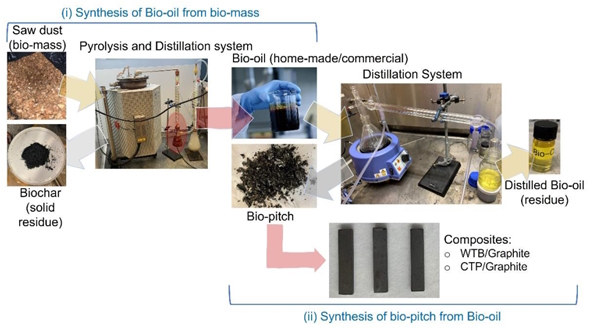Completed: Sustainable Replacements for Coal Tar Pitch Binders
In collaboration with Morgan Advanced Materials
Coal Tar Pitch (CTP) is a residue formed from the distillation of coal tar and is widely used as a carbonisable/graphitisable binder to form carbon electrodes (e.g. for aluminium smelting), seals, specialty graphites for electric brushes and current collectors (e.g. wind turbine generators & rail pantograph systems), and molten metal-conveying components for the metal industries. However, CTP is fossil-derived and toxic and has recently been classified as a ‘sunset’ status material under REACH such that identification of a sustainable alternative is essential for the Foundation Industries dependent on these carbonised/graphitised materials. Wood Tar Biopitch (WTB), obtained from distilling sawdust at temperatures up to 1,000 °C under an inert atmosphere, shows promise as a safe and renewable binder. However, despite several decades of academic interest, socio-economic drivers are only now sufficient for its key shortcomings to be addressed. From a sustainable CTP alternative perspective, these shortcomings include low carbon conversion yields, obstacles to translation to existing manufacturing processes (e.g. poor impregnation and extrusion), insufficient binding to particles and relatively poor properties of the resultant materials.
During this project funded by TFI+ Network, we worked closely with Morgan Advanced Materials to produce Wood Tar Biopitch (WTB) from distilling sawdust and establish a reliable source. The WTB was then mixed with graphite particles and subsequently carbonised and graphitized to produce carbon-carbon composites following processes typically used in industry for the fabrication of their CTP based products. Building on this exploratory project, a follow-on grant funded by EPSRC via Henry Royce Institute (Industrial Collaboration Programme, ICP) was awarded to this academic-industry team to continue exploring the replacement of CTP by a more sustainable binder. This follow-on funding allowed us to develop strategies to refine the composites chemical formulations and improve the microstructure, levels of graphitization and, hence, the properties of the carbon-carbon composites based on WTB during carbonisation/graphitization.

These two projects have helped accelerate the replacement of a sunset fossil derived chemical (CTP), with a bioderived chemical with reduced toxicity (WTB) through both establishing a reliable WTB source and providing a deeper understanding of the underlying materials chemistry of WTB.
Publications
Effect of Sulfur on Wood Tar Biopitch as a Sustainable Replacement for Coal Tar Pitch Binders, https://pubs.acs.org/doi/epdf/10.1021/acsaenm.3c00361

Dr Cristina Valles
University of Manchester cristina.valles@manchester.ac.uk
Dr Cristina Vallés is an academic research fellow at the University of Manchester (Department of Materials). Her group’s research is focused on taking all the exceptional properties of carbon nanomaterials from the nanoscale to macroscopic functional composite materials, including mechanically reinforced, thermally stable and electrically conductive polymer composites that can make an impact in industry, in particular in the aerospace and automotive sectors.
In addition, in collaboration with Morgan Advanced Materials, she is currently investigating sustainable alternatives for Foundation Industries with key investments in molten metal systems, electrical carbon and thermal ceramics, which are dependent on carbonised/graphitised materials.
Published: February 11th, 2022
Posted in
projects





